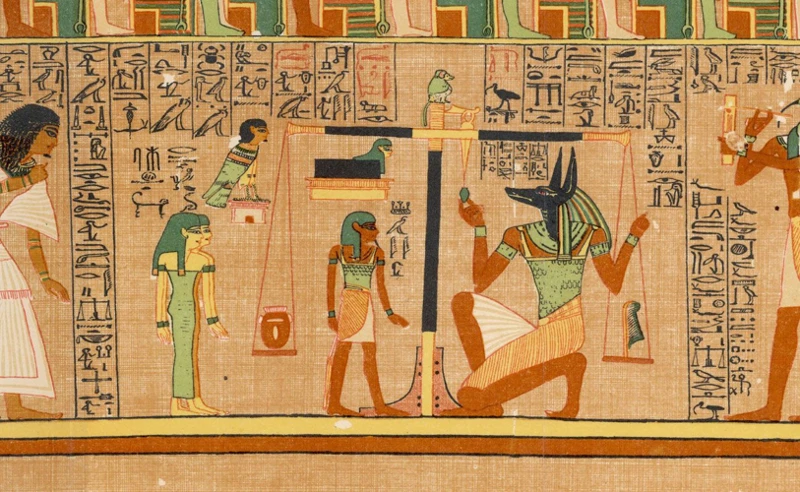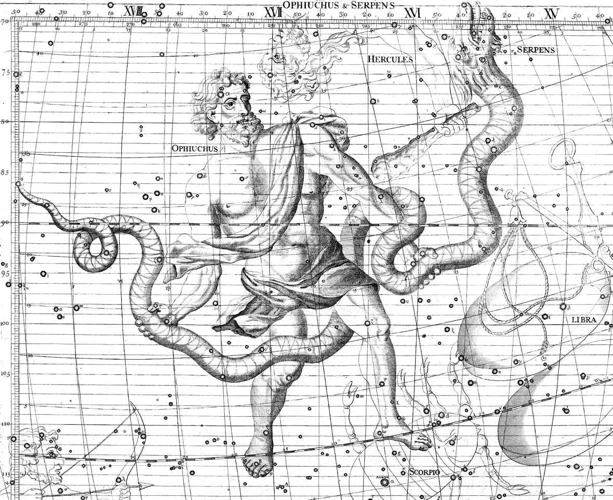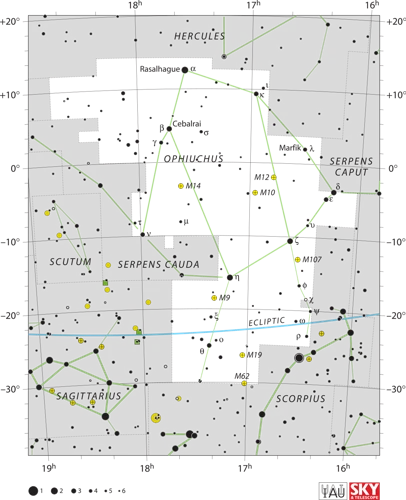Ophiuchus, an obscure and enigmatic constellation, holds intriguing connections and interpretations across various religious and spiritual traditions. This celestial serpentine figure has fascinated ancient Egyptian priests, Greek mythmakers, Hindu astrologers, Native American spiritualists, and even modern practitioners of alternative religions. Exploring the symbolism, associations, and depictions of Ophiuchus in these diverse belief systems sheds light on its role as a healer, guardian, and conduit of spiritual energies. Delving into the ancient past and embracing the contemporary interpretations, this article unravels the mystique surrounding Ophiuchus, inviting readers on a journey to discover the hidden significance of this celestial entity.
Ophiuchus in Ancient Egyptian Religion

In ancient Egyptian religion, Ophiuchus played an intriguing role that intertwined with their spiritual beliefs and practices. While there is no direct mention of the constellation in their mythologies, the symbol of the serpent was highly revered and associated with healing and protection. Egyptians believed that the divine serpent represented the life force and fertility. It was often depicted as a cobra, known as the uraeus, adorning the headdresses of pharaohs to symbolize their divine lineage and power. Additionally, the serpent served as a guardian and protector, safeguarding sacred spaces such as temples and tombs. The connection between Ophiuchus and the serpent symbolism in Egyptian religion highlights the significance placed on healing and the preservation of life.
Symbolism and Interpretations
The symbolism and interpretations surrounding Ophiuchus are fascinating and varied across different cultures and belief systems. In ancient Egyptian religion, the serpent symbolized healing and protection, representing the life force and fertility. The association of Ophiuchus with the serpent in Egyptian culture emphasizes its connection to these concepts. In Greek mythology, the serpent-entwined staff of Asclepius, the god of medicine, is often associated with Ophiuchus. This symbolizes healing and is still used today as the emblem of medicine. The serpent’s shedding of its skin also signifies transformation and renewal, aligning with the themes of healing and rebirth. In Hindu astrology, Ophiuchus is known as Aṣleṣā and is associated with transformational karmic energy. It is believed to have the power to uncover hidden truths and bring about spiritual growth. Native American spirituality views the serpent as a symbol of earth energies and wisdom. The shedding of its skin represents the cycle of life and death, and its presence signifies a connection to the natural world. In modern interpretations, Ophiuchus is sometimes incorporated into astrological systems as the thirteenth zodiac sign, representing individuals born between November 29 and December 17. This inclusion reflects a shifting and evolving understanding of the celestial symbols and their meanings. The symbolism and interpretations of Ophiuchus across cultures highlight its association with healing, transformation, protection, and spiritual growth. (Source: /symbolism-ophiuchus-cultures/)
Ophiuchus in Greek Mythology

In Greek mythology, the figure of Ophiuchus holds a significant place, closely associated with the legendary healer and demigod, Asclepius. Asclepius, known for his remarkable ability to revive the dead, was often represented with a staff entwined by a serpent, which has become the symbol of medicine worldwide. This serpent-entwined staff, known as the Rod of Asclepius, is commonly associated with Ophiuchus as well. The constellation depicts the figure of a man holding this sacred staff, symbolizing the connection between healing and the celestial realm. The prominence of Ophiuchus in Greek mythology highlights the belief in the power of medicine and the significance of the serpent as a symbol of healing and renewal.
Associations with Asclepius and Healing
Associations with Asclepius and Healing:
Asclepius, the Greek god of healing and medicine, is closely associated with Ophiuchus in Greek mythology. Asclepius was renowned for his ability to cure ailments and bring people back from the brink of death. The symbol of Asclepius, a staff with a single serpent wrapped around it, is still widely recognized as a symbol of medicine today. Interestingly, this symbol bears a resemblance to the constellation Ophiuchus, which is depicted as a man holding a serpent. This connection led to the identification of Ophiuchus as the constellation of Asclepius and the embodiment of healing energies. The ancient Greeks believed that those born under the influence of Ophiuchus possessed exceptional healing abilities and were believed to have a special connection with the divine realm. This association with healing and divine intervention further elevated the significance of Ophiuchus in Greek mythology and solidified its role as a symbol of wellness and restoration. To this day, individuals with a keen interest in astrology and personality traits often delve into the characteristics attributed to Ophiuchus, seeking deeper insight into their potential for healing and rejuvenation of both body and soul. (To learn more about the personality traits associated with Ophiuchus, click here.) The importance of Ophiuchus in the constellation pantheon and its connection to healing and the divine realm remains an intriguing aspect of Greek mythology. (For more information on the significance of the Ophiuchus constellation, you can refer to this article.)
Depictions in Art and Sculpture
Depictions of Ophiuchus in art and sculpture can be found throughout history, showcasing the significance and reverence given to this celestial figure in various cultures. In Greek mythology, Ophiuchus is often depicted as a man holding a serpent, representing the god of healing, Asclepius. This iconic image can be seen in ancient Greek sculptures and pottery. The serpent coiled around Ophiuchus’s arm or staff symbolizes rejuvenation and the power of healing. In ancient Egyptian art, Ophiuchus is not directly portrayed, but the symbolism of the serpent can be found in hieroglyphs, wall paintings, and amulets, emphasizing its protective and life-giving qualities. Hindu art showcases Ophiuchus through its association with the deity Vishnu, who is often depicted reclining on the coils of the serpent Ananta Shesha. This representation signifies the cosmic balance and eternal nature of Ophiuchus. Native American tribes, such as the Hopi and Navajo, incorporate serpent imagery in their artwork, connecting Ophiuchus to earth energies and spiritual transformation. These artistic depictions of Ophiuchus across different cultures reflect the belief in its power to heal, protect, and spiritually guide individuals.
Ophiuchus in Hinduism

In Hinduism, Ophiuchus holds a notable place within the realm of astrology. Known as “Serpent Bearer” or “Snake Charmer,” this constellation is associated with the deity Ashwini Kumaras, the twin sons of the sun god, Surya. Ophiuchus is a part of the Hindu zodiac system and is believed to represent the healer and physician archetype. In Hindu astrology, Ophiuchus is considered a powerful influence for those born under its celestial sway. Individuals associated with this constellation are thought to possess a deep understanding of the healing arts and have an innate ability to bring forth transformation and rejuvenation. Despite not having a prominent presence in sacred texts, Ophiuchus plays a significant role in Hindu astrology, guiding the interpretation of planetary influences and their effects on one’s life journey.
The Role of Ophiuchus in Astrology
The Role of Ophiuchus in Astrology is a topic that has sparked much discussion and debate in recent years. Ophiuchus, often referred to as the “13th Zodiac sign,” has emerged as a controversial addition to the traditional twelve zodiac signs. According to astrologers who include Ophiuchus in their system, individuals born between November 29th and December 17th fall under this sign. Advocates of Ophiuchus argue that it brings new dimensions and personality traits to astrology, adding an element of transformation, intuition, and healing to those born under its influence. They believe that Ophiuchus signifies a rebirth, a spiritual journey, and a deep connection to cosmic energies. However, it’s important to note that many mainstream astrologers remain skeptical of Ophiuchus’s significance and choose to adhere to the traditional twelve zodiac signs. Despite the controversy, the inclusion of Ophiuchus in astrology has undoubtedly sparked intrigue and curiosity among astrology enthusiasts, encouraging them to explore this lesser-known aspect of the zodiac and its potential impact on personality traits and compatibility.
Ophiuchus in Sacred Texts
Ophiuchus in Sacred Texts: The influence of Ophiuchus can also be found in various sacred texts associated with Hinduism. One such text is the Mahabharata, an ancient Indian epic that tells the tale of a great war. In this epic, the character of Ashtavakra is believed to embody the traits of Ophiuchus. Ashtavakra was a wise and enlightened sage who possessed deep knowledge of astrology and astronomy. His teachings emphasized the importance of balance and harmony in life. Another significant connection between Ophiuchus and sacred texts can be seen in the Puranas, a collection of Hindu scriptures. In the Puranas, Lord Vishnu, the preserver of the universe, is sometimes depicted with a serpent called Shesha as his bed. The serpent represents the constellations, including Ophiuchus, and symbolizes divine protection. These references in sacred Hindu texts highlight the prominence of Ophiuchus in the religious and philosophical beliefs of ancient India.
Ophiuchus in Native American Spirituality

The presence of Ophiuchus in Native American spirituality is found in the rich symbolism associated with snakes and their connection to the earth’s energies. Native American tribes viewed snakes as powerful symbols of transformation and healing, often representing the cycle of life and death. The snake’s ability to shed its skin and emerge renewed reflected the spiritual journey of individuals seeking personal growth and enlightenment. Snakes were believed to possess a deep connection to the earth and its energies, acting as messengers between the physical and spiritual realms. This association between Ophiuchus and snake symbolism in Native American spirituality underscores the reverence for nature and the belief in the interconnectedness of all living beings.
Snake Symbolism and Connection to Earth Energies
Snake symbolism in Native American spirituality holds a deep connection to the earth’s energies. Native American cultures recognize snakes as powerful spiritual beings, often associated with transformation, wisdom, and healing. The slithering movement of snakes is thought to represent the undulating currents of energy flowing through the earth. This connection to the earth’s energies is believed to grant snakes a heightened intuition and access to the spiritual realms. In many Native American traditions, snakes are revered as guardians of sacred sites and portals to the spirit world. They are seen as mediators between the physical and spiritual realms, capable of bridging the gap between the earthly and divine realms. Snakes are also symbols of rebirth and regeneration, shedding their skin symbolizing the cycle of death and rebirth. In Native American spirituality, the snake’s ability to tap into the earth’s energies is seen as a powerful tool for healers and spiritual practitioners. It is believed that by connecting with the snake’s energy, individuals can achieve a deeper understanding and alignment with the earth’s natural forces, bringing about healing, balance, and spiritual growth. This connection to the earth’s energies through snake symbolism is a fundamental aspect of Native American spirituality, emphasizing the interconnectedness and harmony between humans and the natural world around them.
Modern Interpretations and Alternative Religions
Modern interpretations of Ophiuchus have emerged within alternative religions and spiritual practices. In the realm of astrology, Ophiuchus has gained attention as a “thirteenth zodiac sign,” disrupting the traditional twelve-sign system. Those born under the Ophiuchus sign are believed to possess traits such as intuition, healing abilities, and a deep connection to the spiritual realm. While this interpretation is not officially recognized within mainstream astrology, it has garnered interest and sparked discussions among astrologers and enthusiasts. Ophiuchus has found a place within New Age spirituality, where it is seen as a symbol of transformation and spiritual awakening. Its association with serpents, healing, and balance has made it a focal point for those seeking personal growth and enlightenment. This modern fascination with Ophiuchus showcases the enduring allure and adaptability of ancient celestial symbols in the ever-evolving landscape of religious and spiritual beliefs.
Ophiuchus in Astrological Systems
Ophiuchus in Astrological Systems:
Ophiuchus, also known as the ’13th zodiac sign,’ has sparked interest and controversy within astrological systems. Traditionally, the zodiac consists of twelve signs, each representing specific personality traits and characteristics based on the movement of celestial bodies. However, some individuals argue that Ophiuchus should be recognized as a legitimate sign, challenging the established astrological framework.
Proponents of including Ophiuchus assert that those born under this sign possess unique qualities and traits. They describe Ophiuchus individuals as charismatic, intuitive, and wise, drawing associations with the ancient Greek god Asclepius, the god of healing and medicine. According to astrologers who embrace Ophiuchus, individuals born between November 29 and December 17 fall under this sign.
However, skeptics argue that the inclusion of Ophiuchus disrupts the existing astrological system, which has gained immense popularity and acceptance over centuries. They emphasize that Ophiuchus does not align with the traditional division of the zodiac and point to the lack of historical evidence supporting its recognition as a zodiac sign.
Regardless of the debates, Ophiuchus continues to captivate the imaginations of those interested in astrology. Whether embraced as a legitimate sign or seen as an anomaly, it adds an element of mystery and intrigue to the study and interpretation of astrological systems. Those who explore Ophiuchus may find themselves examining their birth charts with renewed curiosity, seeking to uncover the potential influence of this celestial entity on their astrological identities. To learn more about the personality traits attributed to Ophiuchus, you can read our article on ‘Ophiuchus Astrology Personality Traits‘. Despite the ongoing discussions, Ophiuchus in astrological systems serves as a reminder of the ever-evolving nature of our understanding of the cosmos and its impact on our lives.
Ophiuchus in New Age Spirituality
Ophiuchus has gained considerable attention and significance within the realm of New Age spirituality. In this alternative belief system, Ophiuchus is often viewed as a powerful and transformative energy associated with healing, spiritual awakening, and esoteric knowledge. Followers of New Age spirituality believe that the constellation represents a gateway to higher consciousness and a catalyst for personal growth and self-discovery. Ophiuchus is seen as a symbol of wisdom and the integration of the spiritual and physical realms. Its association with serpents and snakes aligns with the concept of Kundalini energy, which is believed to reside at the base of the spine and, when awakened, rises to activate spiritual enlightenment. Ophiuchus is also associated with the element of earth, symbolizing grounding and connection to the natural world. In New Age spirituality, individuals may seek to work with the energy of Ophiuchus through meditation, energy healing practices, and exploration of their spiritual purpose. This interpretation of Ophiuchus in New Age spirituality showcases the constellation’s role as a powerful metaphor and catalyst for personal transformation and spiritual growth.
Conclusion
In conclusion, the exploration of Ophiuchus in various religious and spiritual traditions reveals a captivating and multi-faceted narrative. Across different cultures and belief systems, Ophiuchus consistently emerges as a symbol of healing, protection, and spiritual energy. While ancient Egyptian religion emphasized the serpent symbolism associated with Ophiuchus, Greek mythology showcased its connection with Asclepius, the god of healing. Hindu astrology incorporated Ophiuchus into its zodiac system, assigning it a unique role in celestial interpretations. Native American spirituality recognized the sacredness of snakes and their connection to Earth energies, intertwining them with the essence of Ophiuchus. In modern times, Ophiuchus has found a place in alternative religions and New Age spirituality, further expanding its interpretations and significance. Whether as a constellation, mythological figure, or astrological symbol, Ophiuchus continues to evoke curiosity and fascination. Its enigmatic presence in religious and spiritual contexts invites us to delve deeper into the mysteries of the cosmos and our own spiritual journeys. Embracing the diverse interpretations of Ophiuchus offers us a glimpse into the intricate tapestry of human belief systems and our eternal quest for meaning and understanding in the vast universe we inhabit.
Frequently Asked Questions
What is the significance of Ophiuchus in ancient Egyptian religion?
Ophiuchus held a symbolic connection with healing and protection in ancient Egyptian religion. While not directly mentioned, the serpent symbolism associated with Ophiuchus represented the life force and fertility, and was revered as a guardian and protector in sacred spaces.
Did Ophiuchus have a specific role in Greek mythology?
Ophiuchus had a strong association with Asclepius, the Greek god of healing. Asclepius was often depicted with a staff entwined by a serpent, which became a symbol of medicine and healing. Ophiuchus played a role in the story of Asclepius and his ability to resurrect the dead.
How is Ophiuchus portrayed in art and sculpture?
Ophiuchus is often depicted as a figure holding a serpent or surrounded by serpents. This representation emphasizes the connection between Ophiuchus and healing, as serpents were seen as divine beings associated with rebirth and transformation.
What is the role of Ophiuchus in Hindu astrology?
In Hindu astrology, Ophiuchus is not traditionally part of the zodiac system. However, in recent times, some astrologers have included Ophiuchus as the thirteenth sign, considering its influence on individuals’ personalities and horoscopes.
Are there references to Ophiuchus in Hindu sacred texts?
There are no direct references to Ophiuchus in Hindu sacred texts, such as the Vedas or the Puranas. The focus of Hindu astrology is primarily on the twelve zodiac signs, known as the Rashis, rather than incorporating Ophiuchus.
What is the significance of snake symbolism in Native American spirituality?
In Native American spirituality, snakes are often seen as symbols of transformation, healing, and the connection to earth energies. Snakes are believed to possess wisdom and are associated with the cycles of life, shedding their skin as a representation of renewal.
How is Ophiuchus portrayed in modern astrological systems?
In modern astrological systems, Ophiuchus is sometimes considered as a thirteenth zodiac sign. Those who align with this system believe that Ophiuchus can influence personality traits and horoscope readings, expanding the zodiac beyond the traditional twelve signs.
What is the connection between Ophiuchus and New Age spirituality?
In New Age spirituality, Ophiuchus is often associated with esoteric knowledge, healing energy, and spiritual transformation. It is seen as a symbol of awakening and an invitation to explore deeper spiritual truths and abilities.
How does Ophiuchus differ from the traditional zodiac signs?
Ophiuchus differs from the traditional zodiac signs as it represents a separate constellation that is not part of the standard zodiac system. It introduces new characteristics and traits that individuals born under Ophiuchus may align with, offering an alternative perspective to astrological readings.
Is Ophiuchus widely recognized and accepted in religious practices?
Ophiuchus is not widely recognized and accepted in mainstream religious practices. Its significance and interpretations vary across cultures and religious belief systems, often presenting alternative perspectives outside the traditional religious framework.








